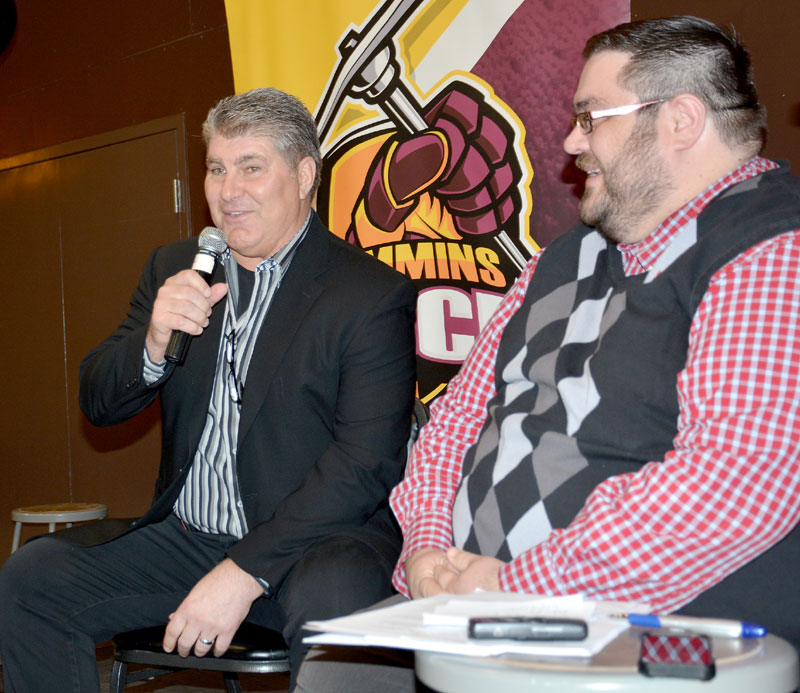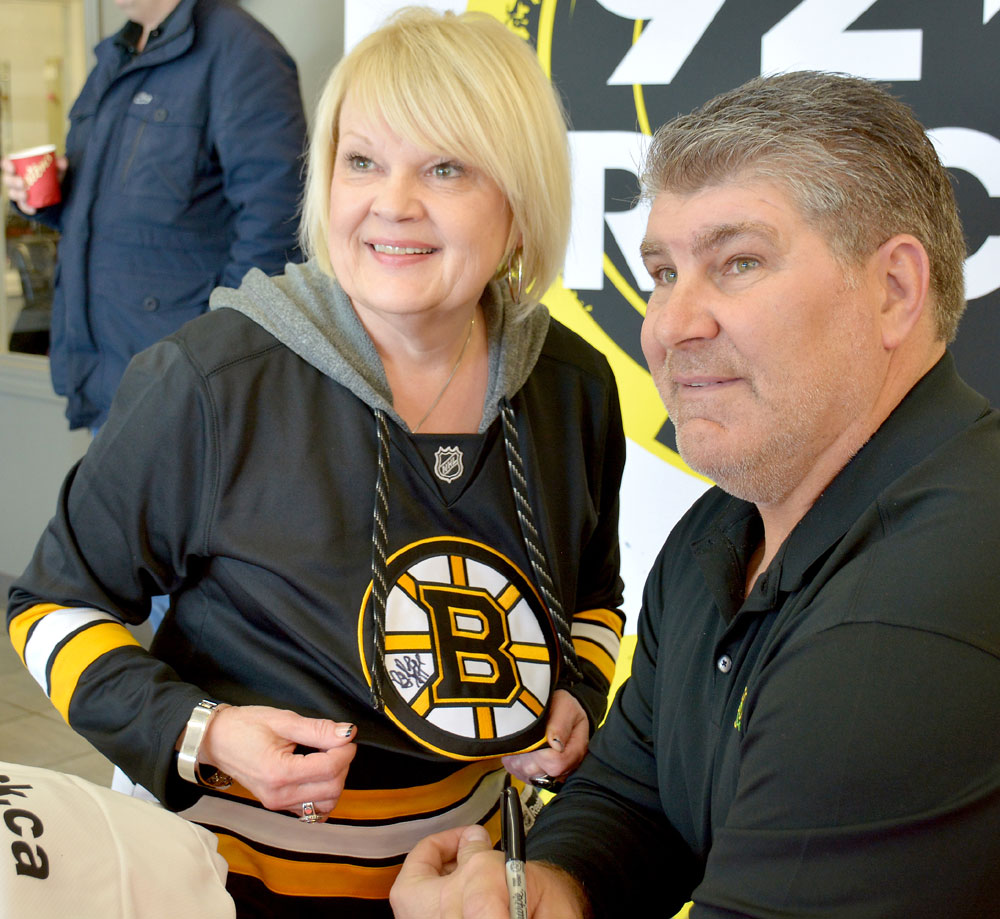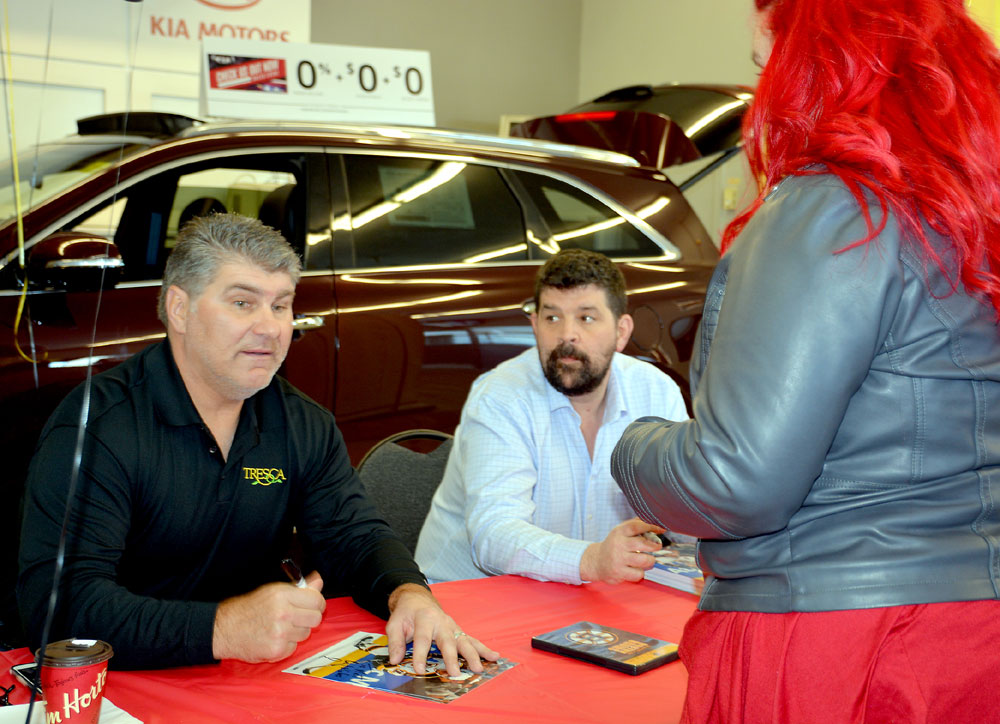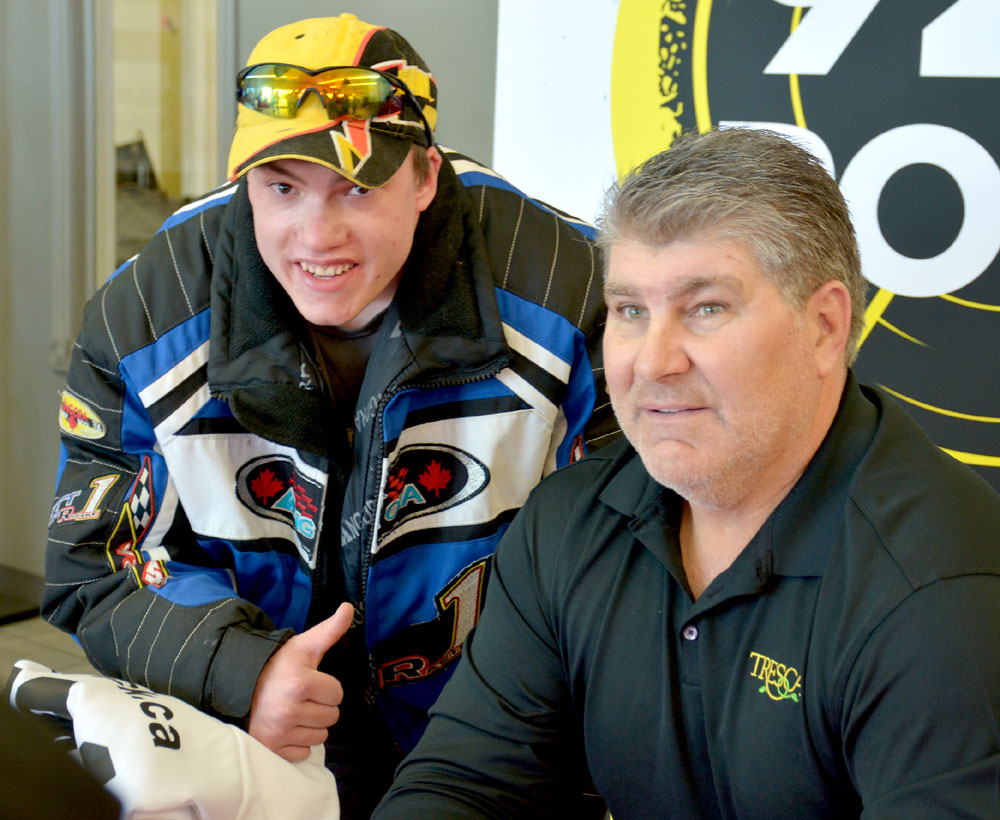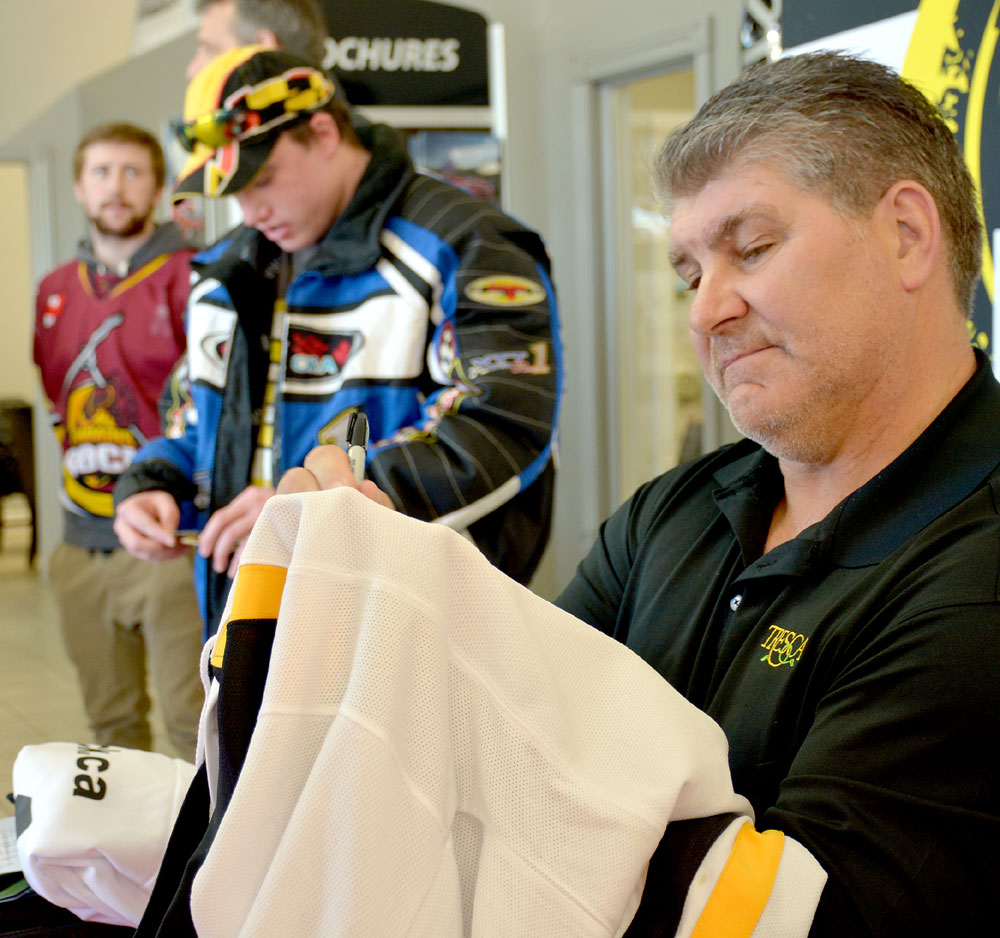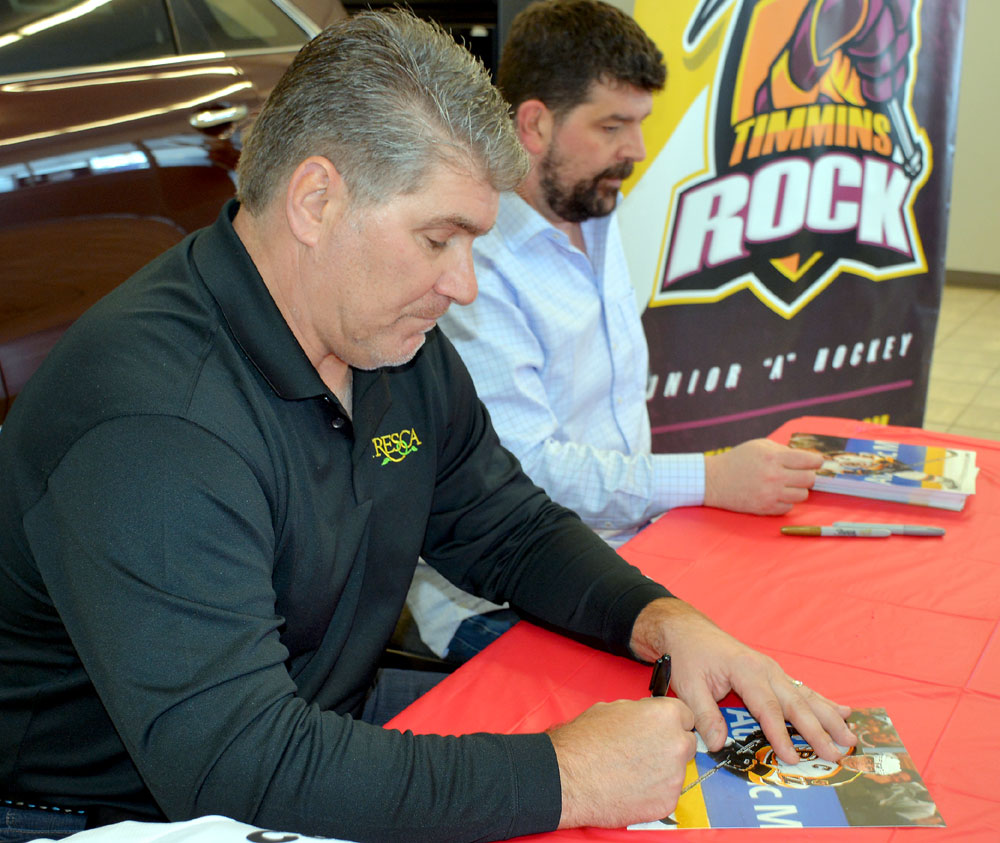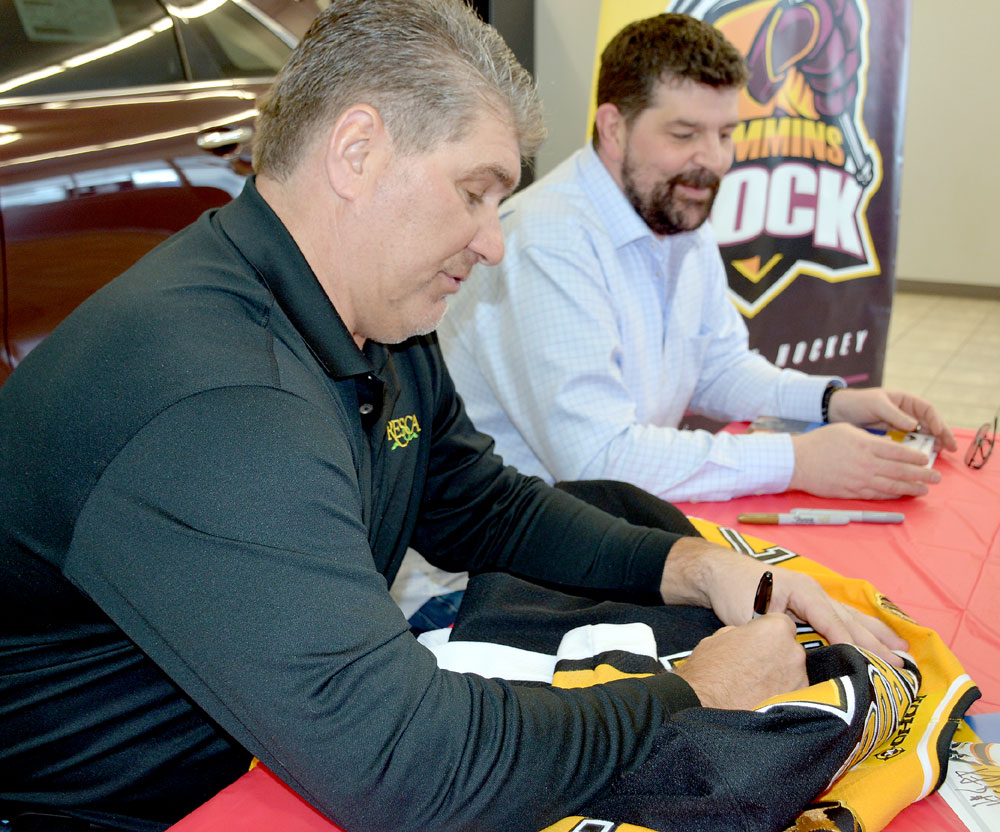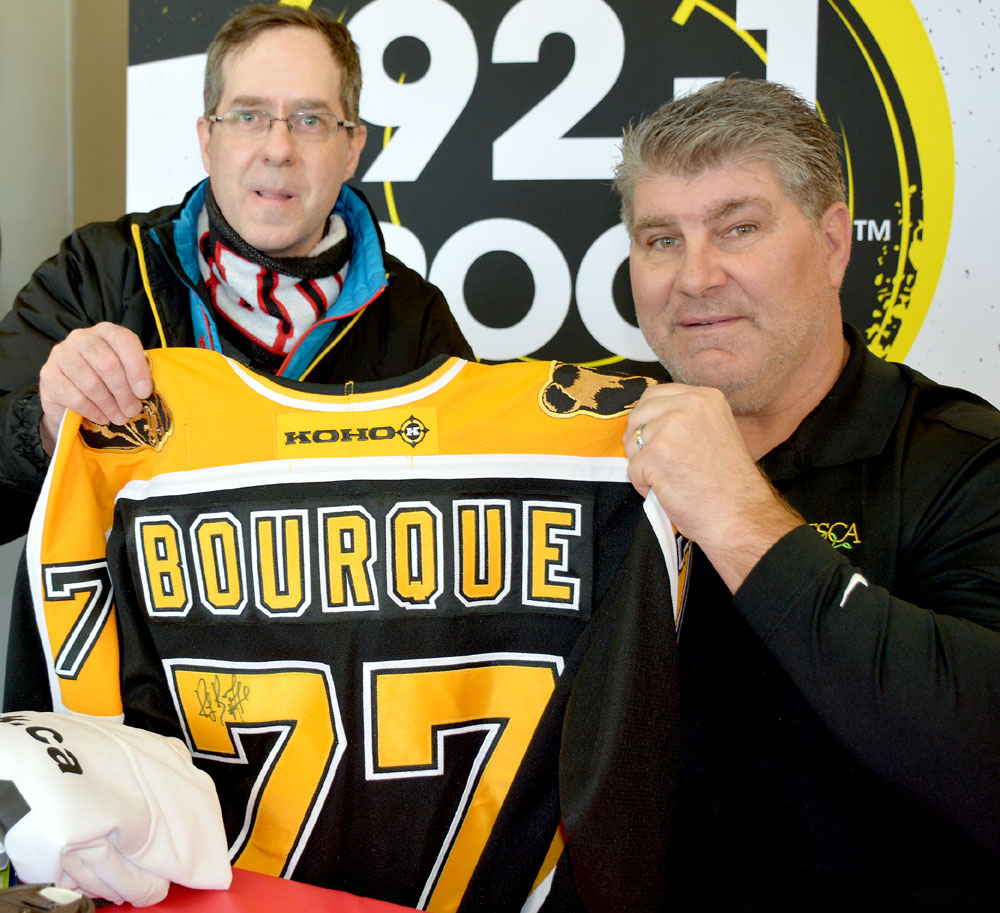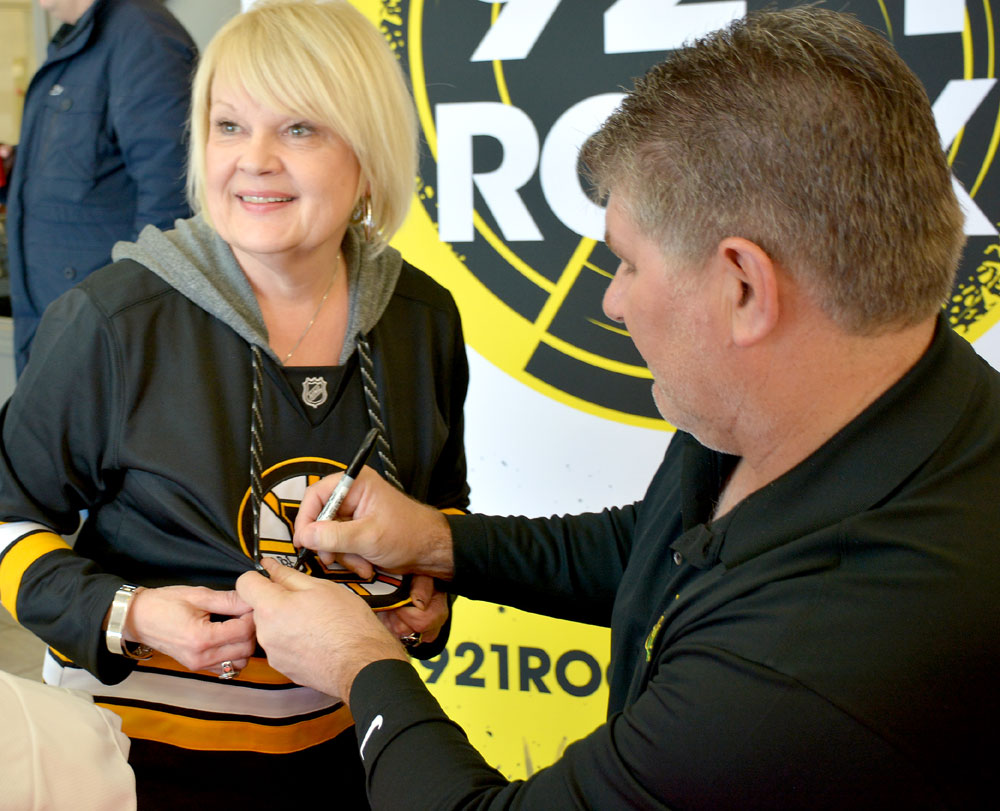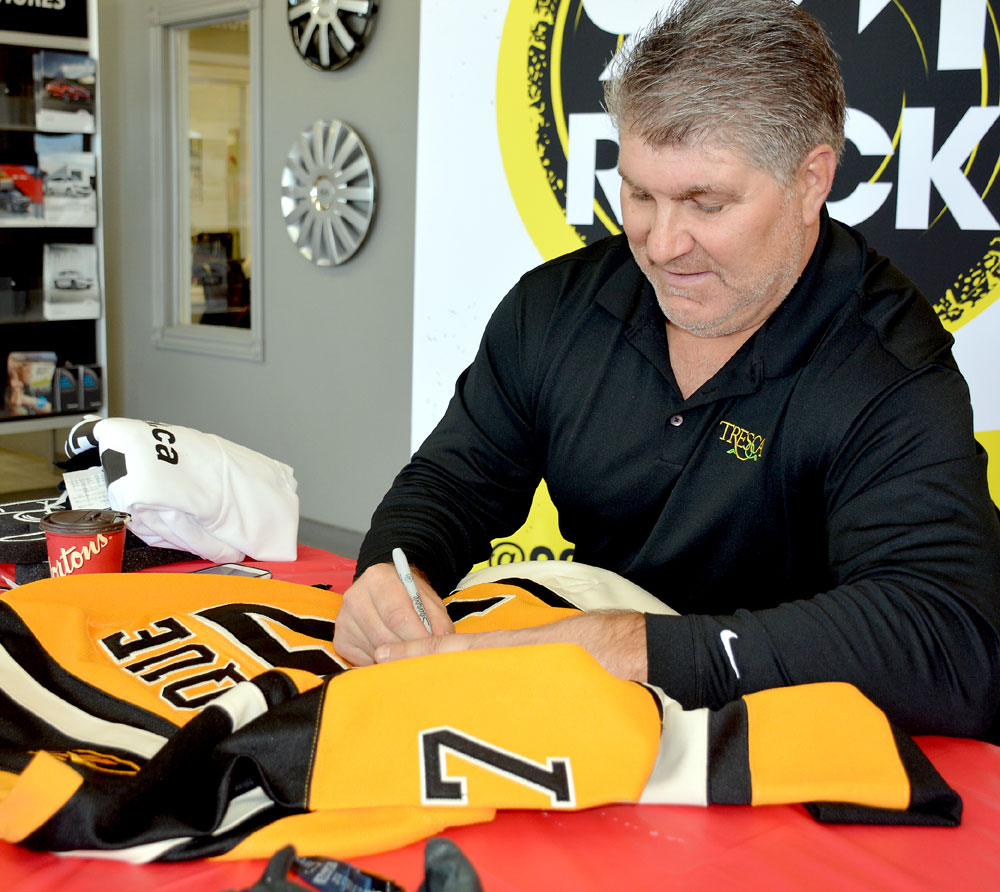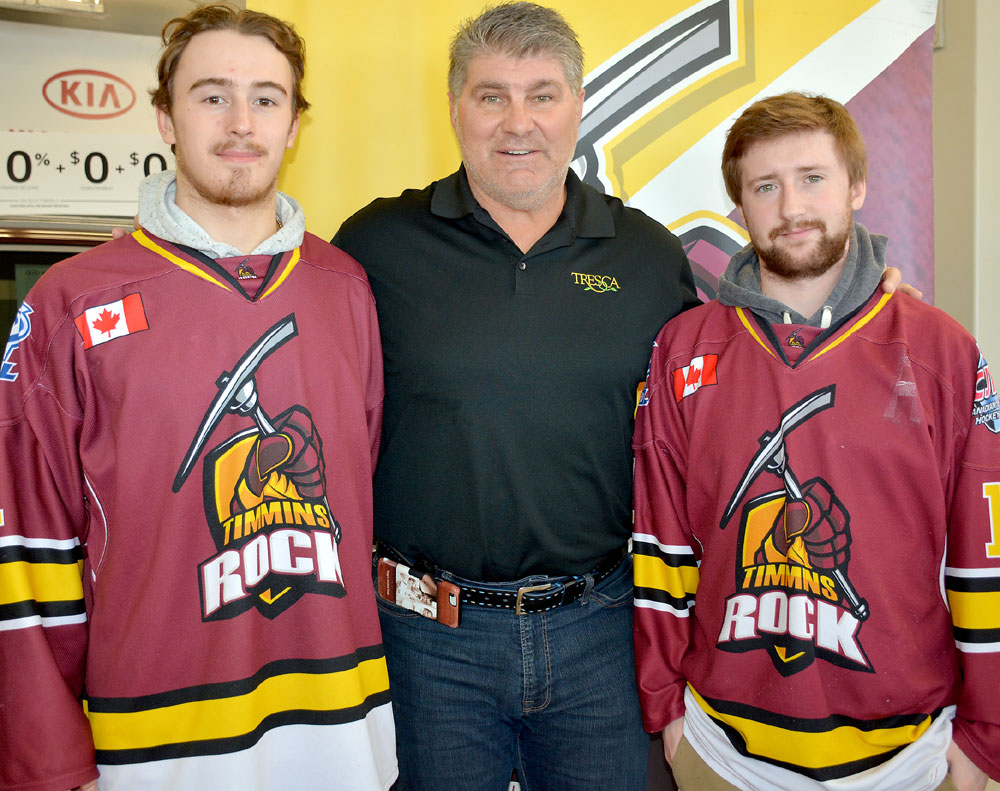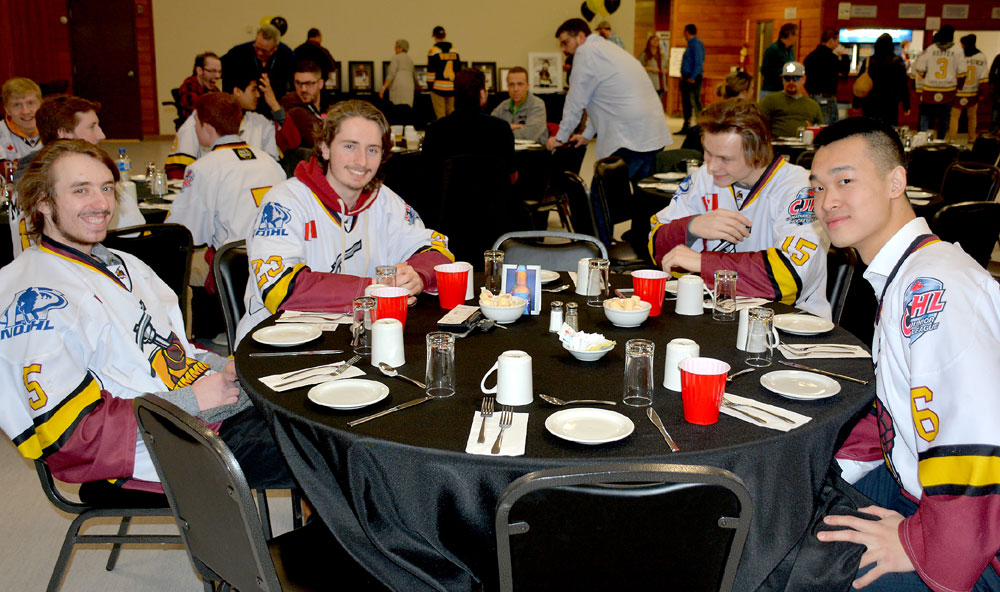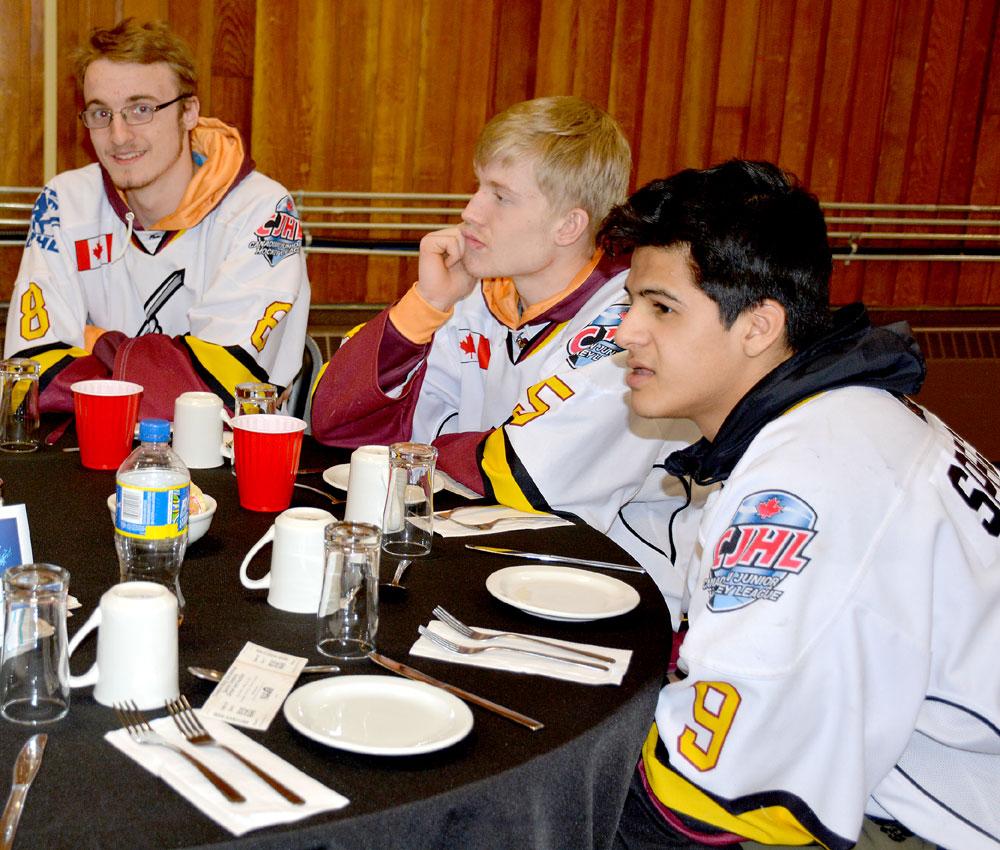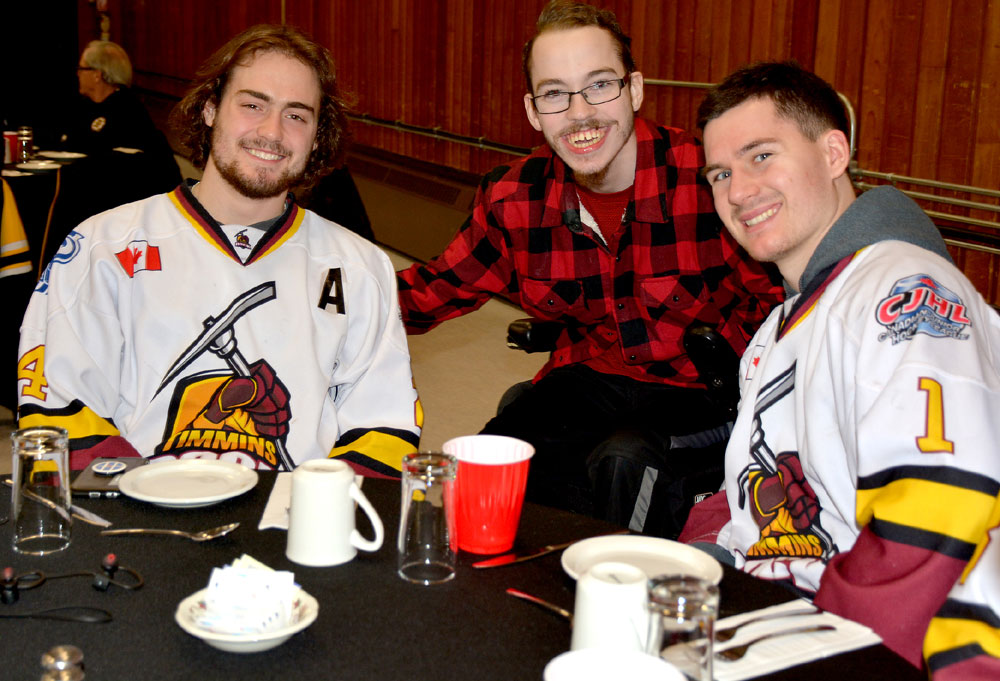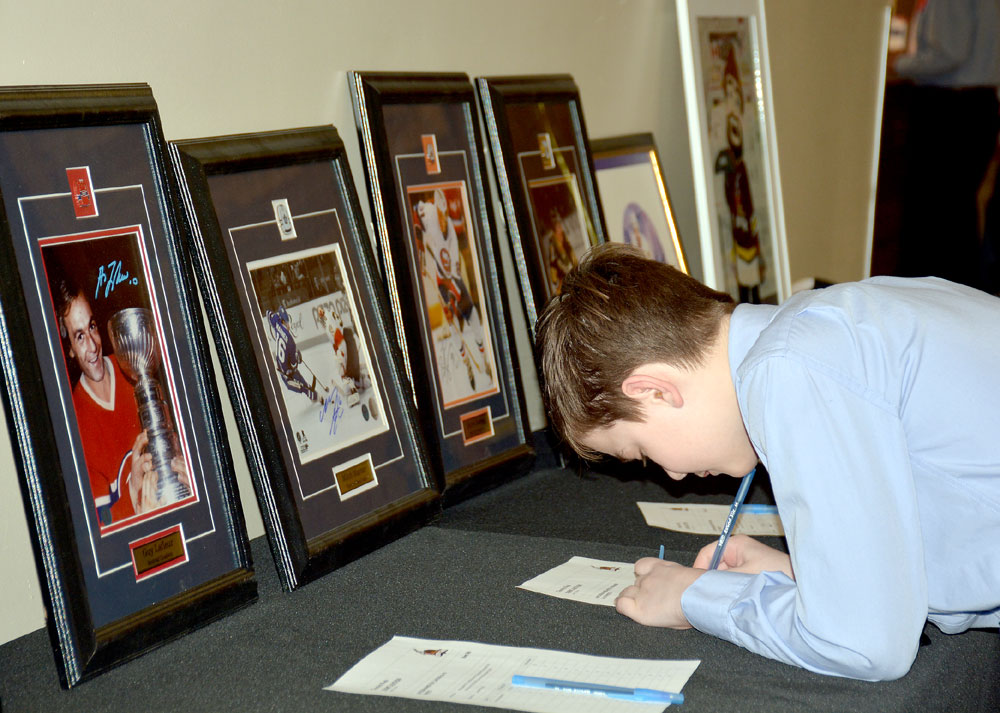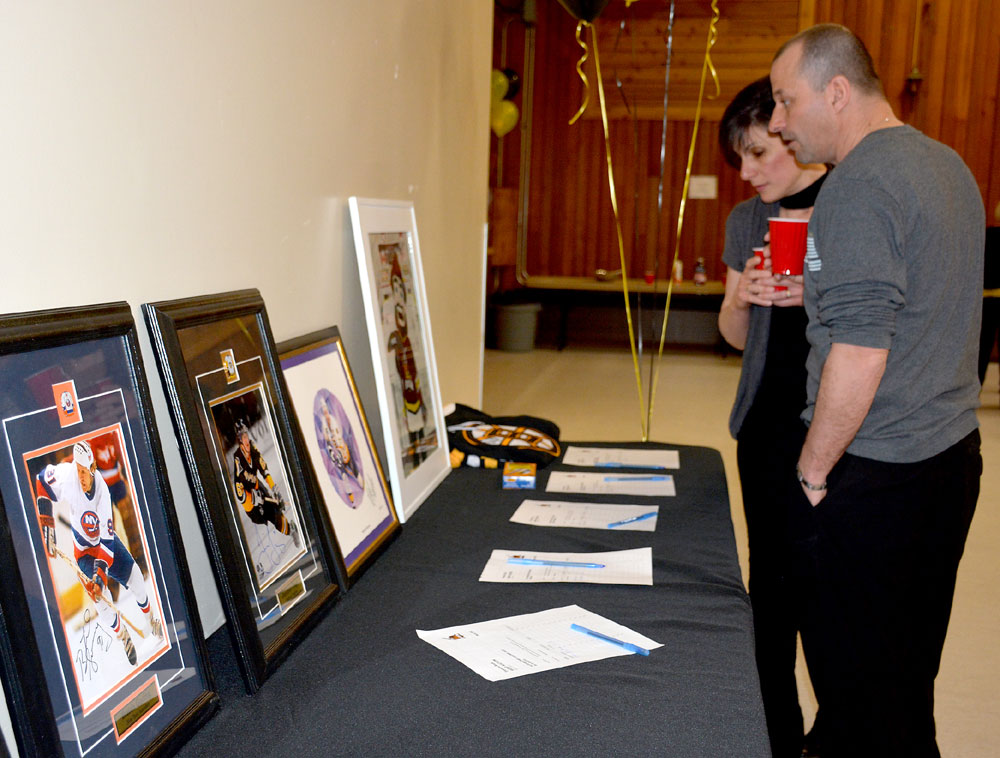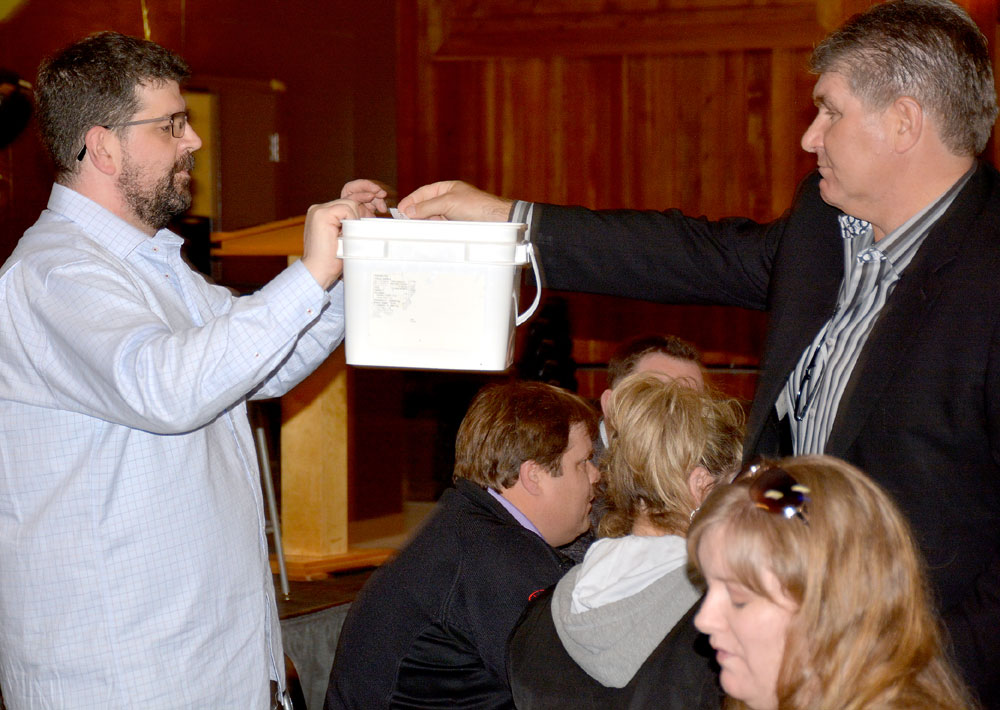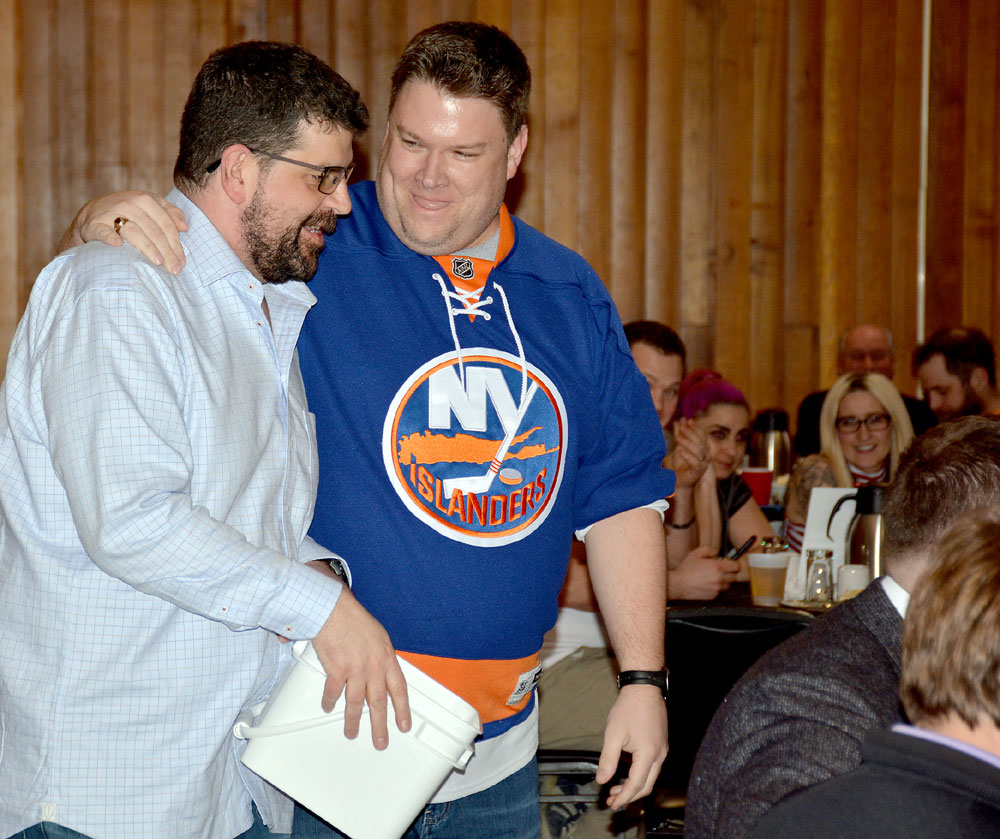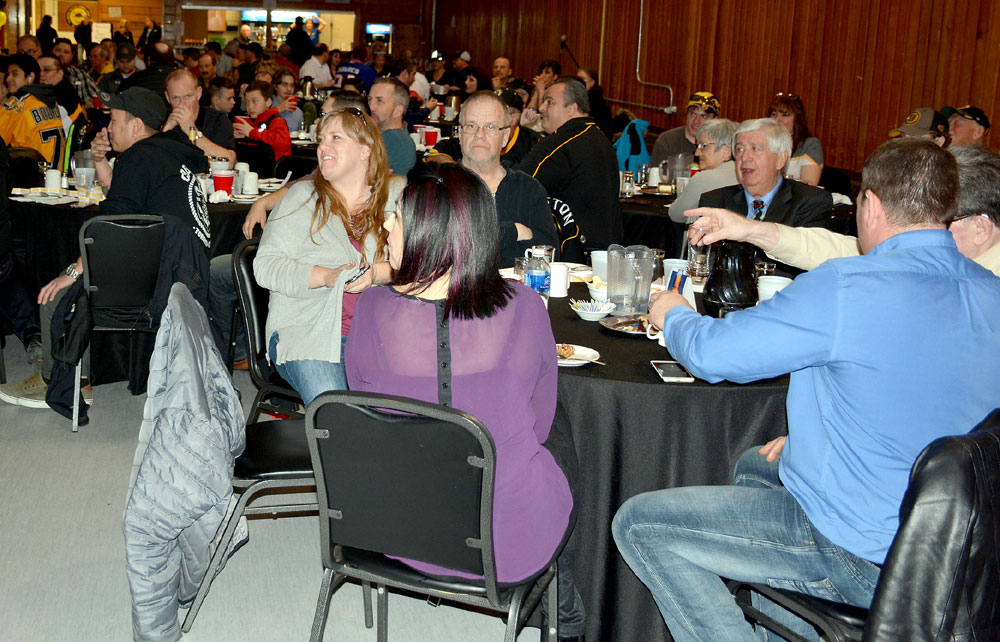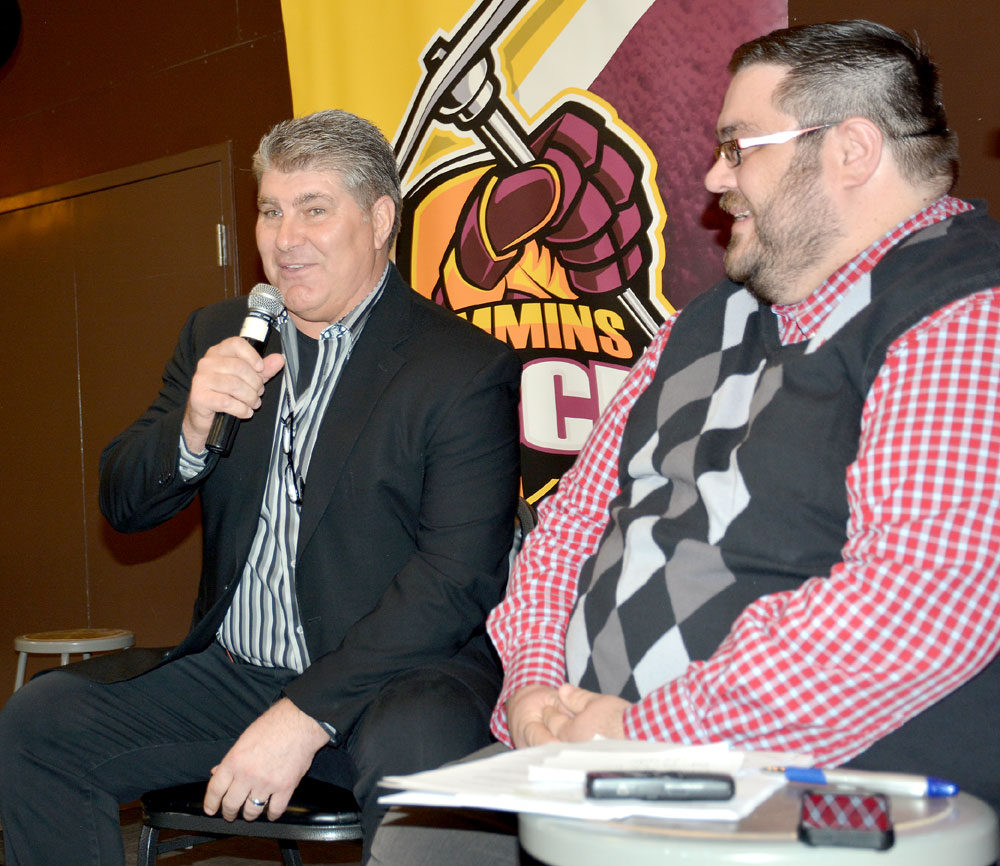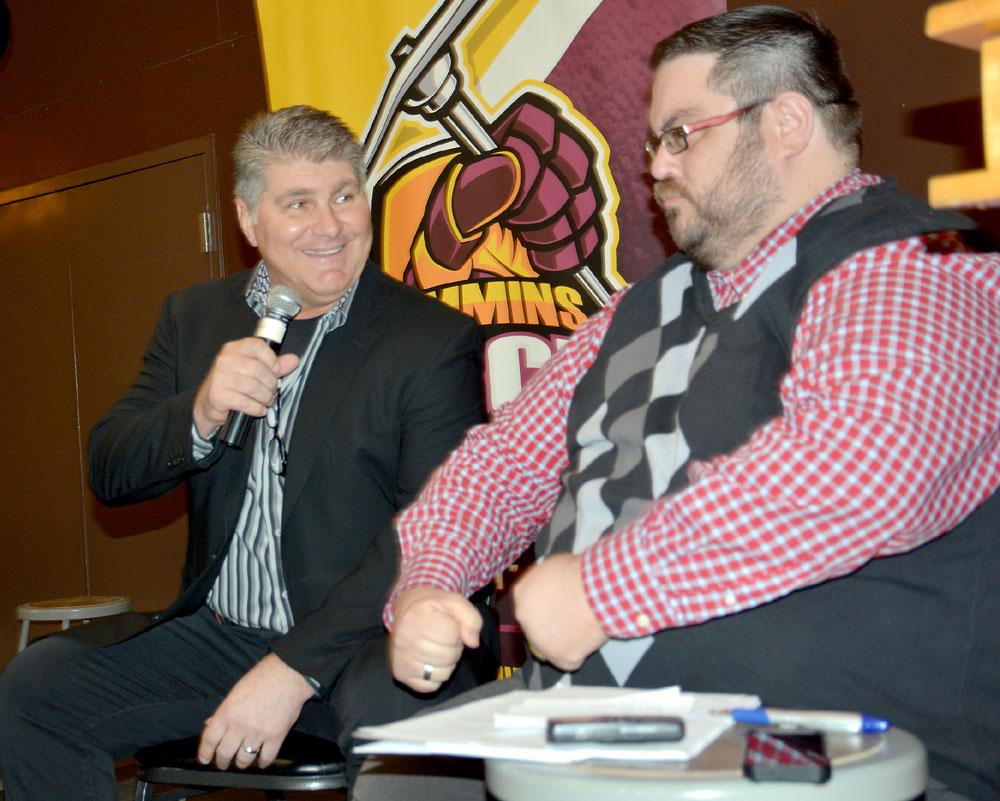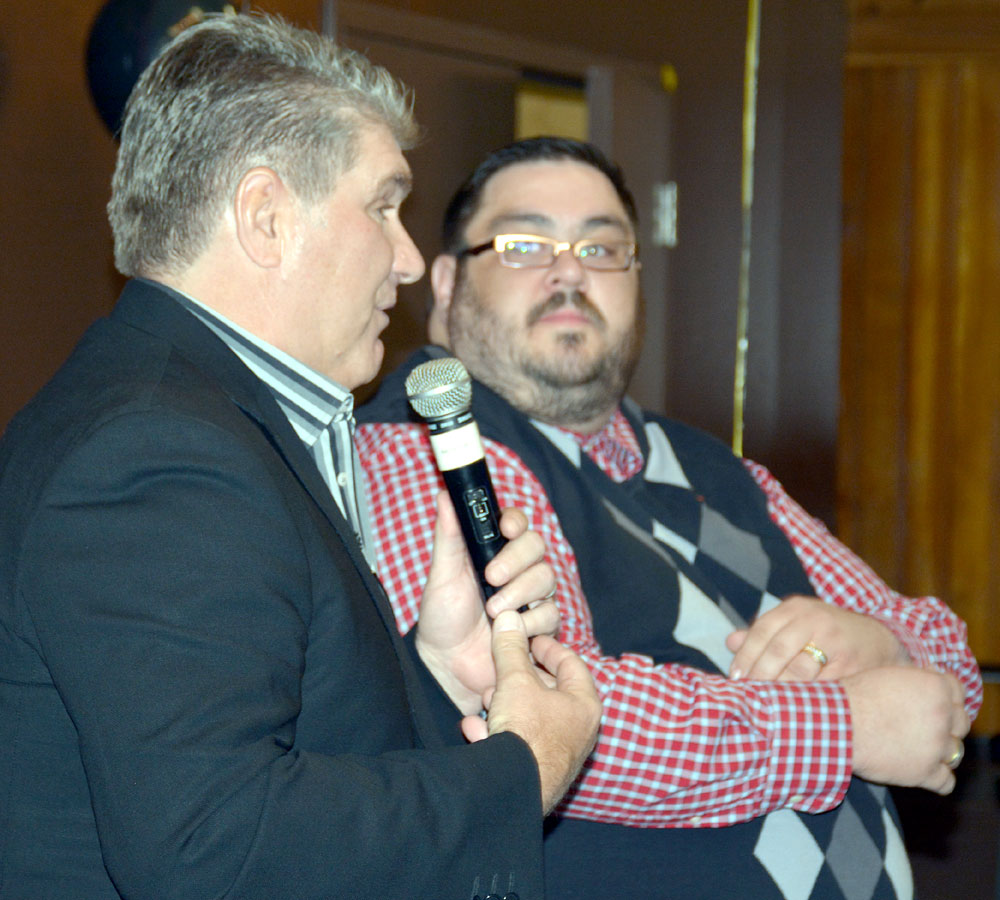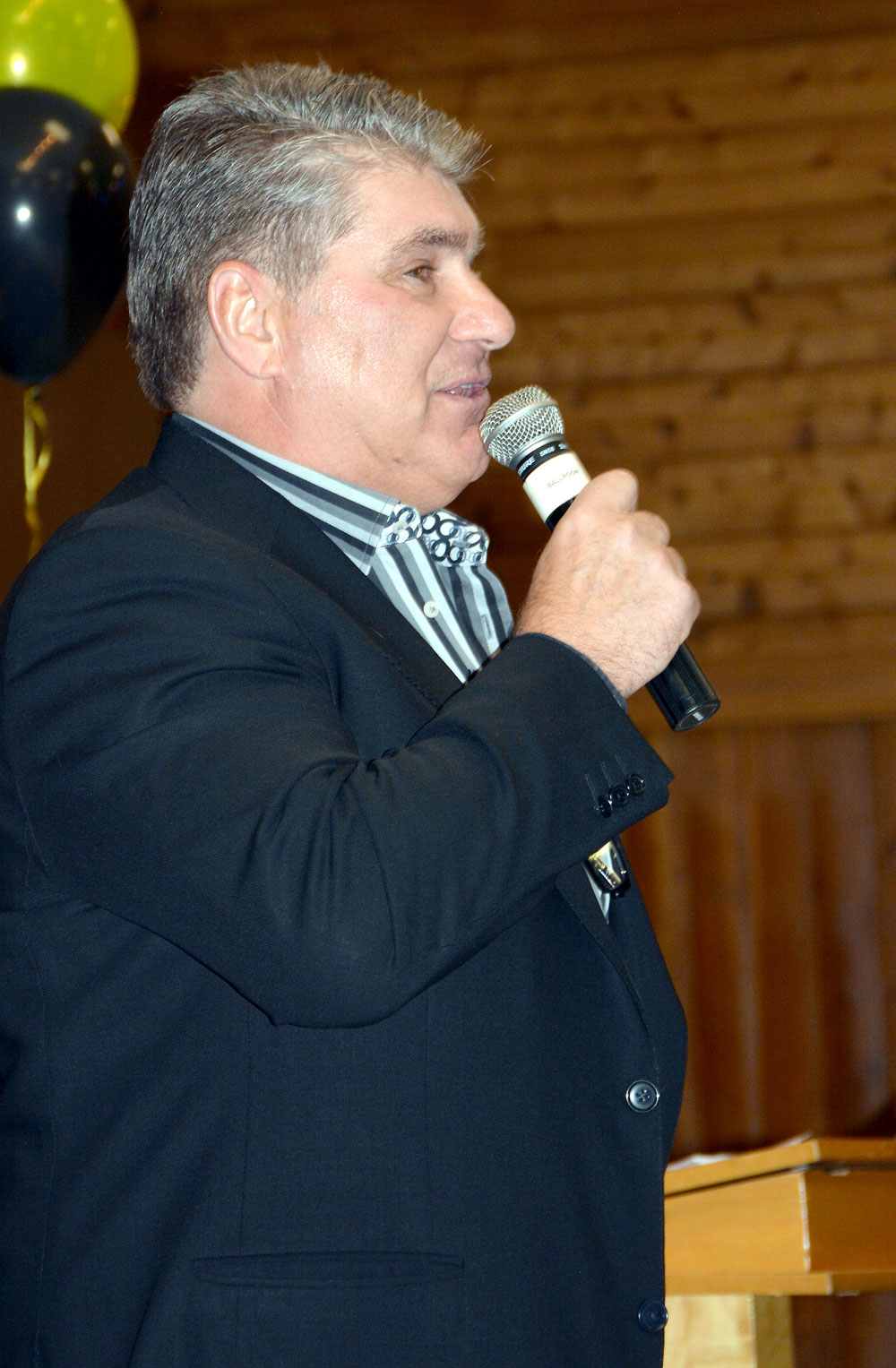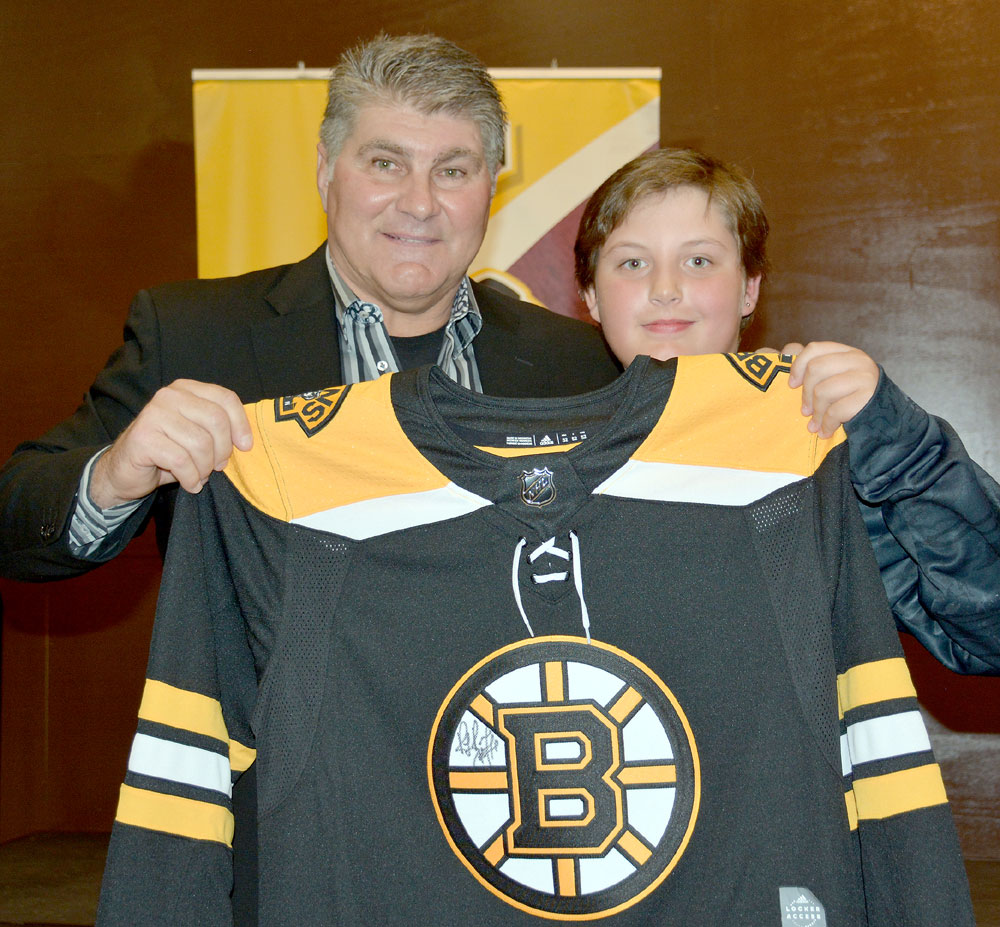Hall of Fame defenceman Ray Bourque relates as story as moderator Steven R.L. Vachon looks on during the 2018 Timmins Rock Celebrity Sports Dinner/Silent Auction Fundraiser in the McIntyre Ballroom Thursday night. Bourque, a long-time Boston Bruin, who ended his career with a Stanley Cup victory in Colorado delighted the large crowd during the second-annual event. THOMAS PERRY/THE DAILY PRESS
![]() By Thomas Perry, The Daily Press (Timmins)
By Thomas Perry, The Daily Press (Timmins)
TIMMINS – Hall of Fame defenceman Ray Bourque entertained fans during the 2018 Timmins Rock Celebrity Sports Dinner/Silent Auction Fundraiser in the McIntyre Ballroom Thursday night.
And given that more than $11,000 was raised during the second-annual event, it has to be viewed as a huge success.
The sale of tickets for the event, a 50/50 draw and a silent auction for merchandise that included an autographed No. 77 Ray Bourque Boston Bruins jersey, Rock season tickets and a varied of frame photos autographed by NHL stars including Frederik Andersen, Mitch Marner, Guy Lafleur and Butch Goring helped ensure the success of the evening.
Bourque, a Saint-Laurent, Que., native brought with him an impressive resume — including winning the Calder Trophy as rookie of the year, five Norris Trophies, 13 NHL First Team All-Star selections, six Second Team All-Star selections and one Stanley Cup championship.
That Stanley Cup victory came near the end of his career in a Colorado Avalanche uniform, but he spent the lion’s share of his career as a Boston Bruin — a fact not lost on the dozens of people in the audience who were wearing No. 77 Bourque jerseys.
Growing up, Bourque — like most folks in La Belle Province — was a big Montreal Canadiens fan.
“The year before I went to Boston, the Memorial Cup was being played in Verdun, where I played my last two years of junior,” he said.
“Brandon (Wheat Kings) was playing the Peterborough Petes and I was at that final game and it was the same night Montreal ended up beating the Bruins in the seventh game with too many men on the ice at the Forum.
“I know a lot of Bruins fans and I love you guys, but back then I didn’t love you so much. So, I was heading back home on the bus and I had a bus transfer right in front of the Forum, and I was like, ‘Yes, we kicked their asses again.’
“Then, the draft was held on Aug. 4 because of the merger with the WHA. It wasn’t like today, where you are up on stage, you come up and wear the jersey and the hat. I was teaching at a hockey school, got called off the ice and my agent said, ‘The Bruins just drafted you eighth overall.’
“I was ecstatic. I was happy, but the switch happened that day. The Habs were left behind and I had to learn to hate them pretty quick. Hate, I know, is a strong word, dislike maybe, but I will go back to hate.”
Despite ending up with an organization that is, to some extent, and even bigger rival than the Toronto Maple Leafs, Bourque could not have been happier.
“I was so lucky to go to Boston,” he said.
“I could have been one of the first three or four picks and gone to Colorado, Minnesota or some other sucky team. I went to Boston where they had lost in the semi-finals and I got to play with Gerry Cheevers, Jean Ratelle, Brad Park, Wayne Cashman, Terry O’Reilly, Rick Middleton, Stan Johnathan, John Wensink, Al Secord. It was such a tough team and so rich in history and tradition. I was surrounded by these great veterans and all I had to do was do my job, go out and play.
“I had an incredible first year. I won rookie of the year. I was named a first team all-star. It was fabulous.”
The face of the Bruins became to change, of course, as Bourque’s career progressed with the organization.
“When I got there, we had a club of veterans, then they drafted really well,” he said.
“We had guys coming. They ended up trading Barry Pederson to the Vancouver Canucks for Cam Neely and their first pick, who ended up being Glen Wesley — two guys who were really impact players for us.
“In the mid-80s, 1985, 1986, 1987, it kind of became our team. Guys who were drafted and some of the trades we made. Rick Middleton was still there, but all the guys I mentioned before were all gone.
“Terry O’Reilly ended up coaching us an 1987-88 was a very special year. It had been almost 45 years since the Boston Bruins beat the Canadiens in the playoffs. That’s a long time. I live in Montreal in the summer and I used to go back to Montreal and hear about it every summer. ‘What happened? They beat you again.’
“Well, in 1987-88 we finally beat Montreal. It was the quietest summer I had in my entire career. I did not hear one thing.
“That allowed us to move on and get to the finals, but unfortunately for us, we ended up playing the (Edmonton) Oilers and Wayne Gretzky. We lost in four to the Oilers, but we had an incredible year.
“The next year, we had another great year. Then, the year after that, we finished first overall and we got to the finals where we met the Oilers again, without Gretzky, but they were still a really good team. We lost in five to them.
“That year, I thought we matched up really well to them. I thought we were ready to roll, but we lost the first game in triple overtime in our building. We had home ice. Then, in the second game, we went out and we were outshooting them big time but halfway through the game we were down 3-1 and ended up losing … ended up losing the series in five games.
“That was really disappointing, but we had an incredible run from 1985 until the early ’90s. We were getting to the semi-finals or the finals every year and that is so exciting.
“That is what you want when you are playing playoff hockey, to get into incredible runs and do something really exciting.”
You don’t play more than 1,500 games in the NHL without accumulating a story or two and while “what happens on the road usually stays on the road,” Bourque was able to share a few.
“Some teams would initiate guys when they are rookies, but in Boston we never did that, but there was this thing called rookie meals,” he said.
“Rookies started making really good money and we thought all right, we are going to make them pay.
“We were in Tampa Bay one night and I was captain. Another thing I miss about hockey is acting like a 15 year old every day.
“When you have a team meal, somebody gets under the table with ketchup, or mustard, something like that and gets a couple of guys shoes. Then they get up, we all knock our glasses and you know. You are like, Oh, s—t. You hope they didn’t get you.
“Being the veteran and the cagey guy I was, I sat in the corner of this really nice restaurant, took my shoes off and put them on the counter behind my head. They weren’t going to get me.
“These dinners could get expensive. Guys would order the most expensive wine, big dinners. It was crazy.
“The food stared coming out and all of sudden this lobster came out and my beautiful shoe, that was without the tassel … and they were new … Adam Oates is sitting next to me. I was sitting at a table with veterans and I stood up and I said, ‘I am telling you right now, whoever did this is dead. He is going down like you wouldn’t believe.’
“Oates said, ‘Ray, I am on it. I am going to find out.’
“The night goes on and Adam comes back and he says, ‘Kyle McLaren did it.’ A rookie. I thought, oh my God.
“He got up and he went to the bathroom and he had this leather jacket on the back of his chair. I grabbed his leather jacket and I went into the kitchen and told the chef slice the sleeves off.
“I put the jacket back and he came back and was like, ‘What’s going on?’
“I said, ‘You messed around with the wrong guy!’ He said, ‘It wasn’t me, it wasn’t me.’
“Turns out it wasn’t him. It was Adam Oates.”
Given the offensive statistics Bourque amassed during his Hall of Fame career and his prowess in the defensive zone, he certainly wasn’t a goon in his playing days. That does not mean, of course, that he was not capable of defending himself — or his teammates — when the need arose.
“I got in like 20 fights in my career and I still feel like I am undefeated,” he said.
“I fought Dennis Polonich one night in Detroit. Gerry Cheevers was our coach and he said, ‘I don’t want anybody messing around with him. If he is on the ice, he is only helping us. He sucks.’
“But he was chasing Terry O’Reilly all over the ice. We had a tough team and they always had my back and I felt like I had to have Terry’s back that night. I was going to take care of him.
“So, I challenged Polonich. He was like 5-9, but he was like an ice box. He was a tough guy, but I go bang, bang, bang and then all of a sudden boom.
“Now, I am like okay, but I get pissed and I finish really strong. I am on top of him, then I go to the penalty box and I can’t shut my mouth. My teeth won’t touch and I am like, this is not good.
“So, I go across the ice and I am playing with my fist, pretending I hurt my hand, I go into the room, go to the hospital in Detroit. Broken jaw. Out for six weeks. Oh my God.”
Two other recollections from his past are near and dear to Bourque’s heart, as well.
“People come up to me and they ask about two things that have nothing to do with scoring a goal, or a big win,” he said.
“One was the night they retired Phil Esposito’s number. I actually wore No. 29 in training camp. I showed up for the first regular season game and No. 7 was hanging at my stall. I recalled who wore No. 7 for the Bruins, of course. I saw him play against the Canadiens all the time.
“I said nothing. I just got dressed. I was 18 years old and I was just happy to make the team and play my first NHL game at home against the Winnipeg Jets. I think it was Oct. 10, 1979.
“Bobby Schmautz, a veteran, came up to me before I went out on the ice and said, ‘If you hear any hecklers, don’t worry about it. Just play your game.’ I’m like, great. I have got to wear this number. I didn’t hear anything all year. Things went great, other than the press every once in a while the press would come up to me and ask, ‘What do you feel about Phil Esposito’s number being retired?’
“I am like, Phil Esposito is a legend here. He won two Cups. He did incredible things. Of course it should be retired.
“Well, I wore it up until Dec. 3, 1987, and they decided to retire his number.
“When Harry Sinden traded Phil, Phil was so pissed. Him and Harry did not see eye to eye from that point on. So, there was really no communication in terms of this happening.
“I had been wearing No. 7 and I am like, what’s going to happen. I didn’t know what was going to happen up until 1 p.m. that day. Terry O’Reilly, our coach, called me at the house as I was about to go down for my pre-game nap after my pre-game meal.”
When people ask Bourque what he misses most about playing hockey, he notes it is his “pre-game meal and pre-game nap.”
“Terry says Harry wants to if you are willing to go out for warm-ups wearing No. 7, come back in, put No. 77 under No. 7, go out for the ceremony, we call Phil up, you take No. 7 off and give it to Phil, revealing No. 77.
“I am like perfect. Nobody knew this was going to happen but my wife, the trainers, the coaches and management, no press, no fans, no teammates. Nobody knew. It was a surprise to everybody, especially Phil Esposito. He never expected it to happen.
“I maintain to this day, it is the first time anybody has ever seen Phil Esposito speechless in his life. I knew I had made his day right there.
“Everybody in Boston remembers this story and comes up to me and talks to me about it.”
The other recollection involves a former young teammate whose career was cut short because of a medical condition.
“Normand Léveillé was our first rounder who played for Chicoutimi in the Q(MJHL),” Bourque said.
“He came to us and had an incredible rookie year. I think he scored 20 or more goals. He was fast. He had a great shot. He was explosive. He was meant to be a great player.
“His second year, in Vancouver, between the first and second periods, he had a brain aneurysm and he never played after that.
“He wasn’t supposed to survive that night, but he did. He was in a coma for the longest time. I can remember visiting him in the hospital after he was transferred from Vancouver to Montreal.
“He later came out of it, but he was paralyzed on one side.
“During the closing of the (Boston) Gardens, in 1995, there was an exhibition game against the Montreal Canadiens, the last game played there. They brought back every alumni, every legend they could think of in the Bruins history and the last person introduced was Normand Léveillé.
“He had one dream, to skate again on the Boston Gardens ice. We put skates on him and I pulled him around the ice, with two guys kind of holding him up.
“There wasn’t a dry eye in the place. People come up to me and say, ‘Ray, I can’t forget that night.”
Steven R.L. Vachon, who played Ron MacLean to Bourque’s Don Cherry during the post-dinner session, sought out a little advice for the Rock who were facing a must-win Game 5 in Cochrane Friday night (details were not available at press time).
“They are currently in a playoff run, in a bit of a bad spot, down 3-1,” he said.
“They beat out Hearst. See you later. Then they came up against the No. 4-ranked team in Canada, the Powassan Voodoos, and they did what people thought was impossible.
“Is there anything in your career that would help out these fellows at the stage they are at in their playoff series?”
Bourque responded: “We were down 3-2 in the finals against the New Jersey Devils. They were the defending champions and they beat us like 5-1, so nobody was giving us a chance to go into New Jersey and win Game 6, but what it comes down to guys, is one game.
“What you are looking for Friday night is to win one hockey game. Were you guys favoured to beat the No. 4-ranked team in Canada? No, but you frigging found a way to do it, right.
“All you have to do is win one game, one period at a time, one shift at a time. Break it down and don’t think about the outcome. Think about the process.
“Everybody has to be on board and everybody has to believe. You can’t have one person not believing.
“Let’s bring this frigging thing back to this building.
“That night against New Jersey nobody gave us a prayer, but we kicked their ass 4-0 and went back to Denver and closed it out.”
In addition to delighting the audience with tales of his playing days, Bourque also sang a “very special song” for youngster Patrice Lafontaine, son of Rock team doctor Robert Lafontaine and a member of the Timmins Polar Bear Windows and Doors North Stars Peewee ‘AAA’ squad, who was celebrating his birthday at the event.
While scouts for this year’s Stars & Thunder Festival may not have jumped up to sign Bourque immediately, he did receive a rousing round of applause from an appreciative audience.
It was Bourque’s first visit to Timmins, but his many fans certainly hope it won’t be his last.
“Every once in a while I would hear about Timmins, but I thought it was just outside Toronto,” he said.
“When we were talking about this gala, they said they were going to fly me out of Toronto and I asked how far it would be to drive. They said about 10 hours. Okay, I get it now, not just outside of Toronto.
“Then, we got on the plane and half the plane was speaking French and I am like, where am I going? I am from Montreal and I speak French, so I was like, great.
“When Ted picked me up I started hearing about Timmins and its hockey history, which makes this a special city. Then, I looked around the rink (McIntyre Arena) and half the guys I saw on that board, I played against, and I played with a couple of those guys.
“So, this is a pretty special place and I am very happy to be here.”




















